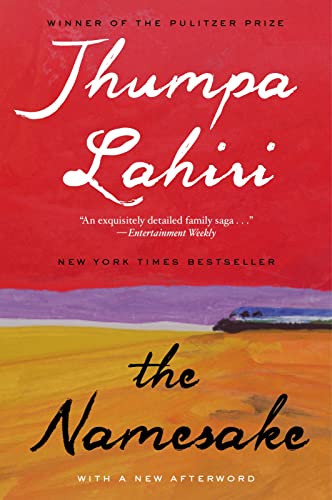Hey folks, Steve here! Welcome to my review of the book ‘The Namesake.’ If you’ve ever felt like you don’t quite fit in (or if your parents gave you a name that sounds like a sneeze), this one’s for you. I’ll share my take on cultural clashes, family madness, the struggle of finding yourself, and why this book made me call my mom right after finishing it. Buckle up, let’s get this review rolling!
The Namesake Book Review
In a nutsheel
The Namesake is a literary novel by Jhumpa Lahiri that’s all about family, roots, and figuring out who you are when you feel like you don’t fit in anywhere. This book lands in the coming-of-age and contemporary fiction genres, which is fancy talk for stories about growing up and real life problems. The story follows Gogol Ganguli, a kid with a very memorable name and even bigger family issues. If you’ve ever tried to explain your weird lunch at school or been stuck between two cultures, you’ll get this book. Lahiri serves up a thoughtful look at what it means to be an outsider, the struggle of immigrant parents and their kids, and the strange power of names. No plot twists spoiled here, but you’ll end up caring a lot about the Ganguli family—and maybe even your own strange name, too.
Exploring Family Bonds and the Immigrant Experience in ‘namesake book’
Family. You can’t pick them, but you can’t live without them either. In the namesake book, family isn’t just a group you eat dinner with or roll your eyes at when they tell embarrassing stories. It’s central to everything. As I read this book, I felt like I was at one of my own loud family gatherings—someone always misunderstanding something, but still loving each other through all the mess.
The author did an amazing job capturing how tricky the immigrant experience can be, especially for families. I once visited my cousin right after she moved from another country. Her parents clung to all their old traditions, but she just wanted to eat pizza and watch TV. This book gets that exact feeling. Characters try to respect their roots while figuring out how not to stick out like a sore thumb at school or work. It made me laugh and wince, because, let me tell you, it’s awkward when your mom shows up at parent-teacher night in a sari and everyone else is in sweatpants.
The book also shows the pressure parents put on kids to succeed in a new land, while the kids are secretly Googling “how to fit in.” The struggle is real. The big plus here: The writing felt honest and easy to relate to. The only con is that sometimes the family drama got a bit heavy and I needed a snack break (donuts help). Still, I’d read it again just to live through their highs and lows.
If you thought this part was good, wait till you see what I have to say about identity and personal growth—spoiler: it’s juicy!
Exploring Identity and Personal Growth in The Namesake
Finding out who you are is tough, but doing it with a name like Gogol? Now that’s a challenge. In ‘The Namesake,’ identity is a winding road full of potholes, odd traffic signs, and the occasional existential flat tire. The book follows Gogol Ganguli as he tries to figure out where he fits in—between his parents’ traditions and his own ambitions. I get it; I once tried to reinvent myself as “Steve the Wise” in middle school. It lasted until I tried saying something wise and accidentally quoted SpongeBob.
The beauty of ‘The Namesake’—and the thing that kept me turning pages—is how real Gogol’s struggle feels. He’s not just dealing with a weird name he doesn’t like (haven’t we all?), but also with how that name shapes what people expect from him. Author Jhumpa Lahiri nails that teenage moodiness and confusion. Gogol’s journey shows that growing up means figuring things out for yourself, even if those things start with your name.
Personal growth in the book isn’t a one-way street. Gogol stumbles, gets back up, and sometimes steps right into another puddle. He learns that holding on to who you are is sometimes harder than becoming someone new. By the end, he’s no superhero, but he understands himself a little better—and that’s a victory in my book!
Hang tight, because next we’ll crash (probably literally) into the wild world of cultural clash and adaptation!
Cultural Clash and Adaptation in The Namesake: When Biryani Meets Boston Baked Beans
Have you ever tried to order a cheeseburger with a side of samosas? That’s what life feels like for Gogol and his family in The Namesake. Jhumpa Lahiri serves up a plate full of cultural confusion, with a spicy side of laughs and awkward moments. The Ganguli family moves from Kolkata to Massachusetts, and let me tell you, it’s not all chowder and roses.
We witness classic culture shock from the moment Ashima tries to eat Cornflakes with banana slices and feels like she’s chewing on glass. I remember my first time at an American Thanksgiving dinner—cranberry sauce looked suspiciously like jelly, but it sure didn’t taste like it. Ashoke and Ashima try to fit in, but still cling to their Bengali roots, celebrating Durga Puja in a living room that smells like curry powder and Lysol. The book does a great job showing how the Gangulis juggle two worlds—attending PTA meetings while also organizing big Indian feasts where the neighbors are both curious and confused.
Gogol, meanwhile, bounces between cultures like a ping-pong ball. He resents his funny name at times (who names their kid after a Russian writer, anyway?) and struggles to fit in at school where his lunch smells “different.” Yet, over time, Gogol swings back and forth, learning it’s okay to be a little bit of both.
Stick around as we turn the page to something even trickier in the next section: how much do names and heritage really shape who we are? Spoiler—mine’s not Steve, but that’s a tale for the next course!
Unpacking Names and Heritage in the Namesake Book
Let’s get this straight: names are a big deal. If you’ve ever had to spell out your name three times at a coffee shop, you’ll know the pain. In namesake book, names don’t just get misspelled—they carry whole histories and loads of expectation. Poor Gogol, the main guy, gets stuck with a name that’s both a tribute and, to him, a bit of a curse. Imagine your parents naming you after their favorite author, and every time you introduce yourself, you have to tell the life story of some Russian dude. Fun at parties, right?
What I really liked is how the book treats the topic of heritage. It’s not just about passing down recipes and awkward family photos. In namesake book, heritage is tangled up in identity, pride, and a dash of confusion. You see his parents wanting to pass down their Bengali roots, but also wanting the best for their kid in America. It’s like trying to make curry with ketchup—sometimes it works, sometimes it’s just weird.
There’s a lot of humor in these moments. Gogol’s struggle with his name is both funny and kinda sad. He fights it, then maybe embraces it, then goes back to fighting again. I think we’ve all had that moment where we wished we were someone else—or at least, called something cooler.
Would I recommend namesake book? You bet your hard-to-pronounce surname I would. It’s warm, honest, and will make you think twice next time you meet someone with a special name.
Conclusion
Well, that brings us to the end of my review for ‘The Namesake.’ I laughed, I sighed, and yes, I may or may not have texted my own parents in the middle of reading. The book is heartfelt and honest, with a bunch of relatable family moments and struggles about identity. Sure, sometimes it gets a bit slow—like waiting for your uncle to finish telling a story at a family dinner—but most of the time, it’s a page-turner. If you like stories about finding where you fit in, or you enjoy peeking into immigrant families’ lives (without creeping outside their window), this one’s worth your time. Wrap it up, put a bow on it, and call your mom—this review is officially done!



